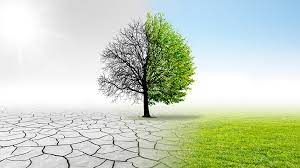
Is It That We Just Don’t Care?
On my daily bike rides around the “foothills” of our little community in Colorado, I get several long-distance looks at downtown Denver. At least half the time, it, and much of the front range of the Rocky Mountains, are enveloped in smog.
This isn’t new. I can recall the same view on occasional visits here years ago. It makes you wonder what we humans are doing to our common home and why nothing seems to get done about it.
I’ve written often about the subject of protection of the environment, but when I check the readership of my blogs about the subject, I find it’s always low. Is that because people just don’t care?
Not Affected Us Personally?
I don’t know, but I can think of a few causes for this apparent indifference. One is that no natural disaster or extreme temperature may have personally affected us. We tend to care more about what affects us personally.
Secondly, we may believe that it’s one of those things over which we have no control, that there’s nothing we can do about global warming. That’s a cop-out, seems to me.
First, we can all do the “little things” – avoid waste, be efficient in use of resources, do what we can to preserve and protect the natural environment – and advocate for that in our families, place of employment and businesses.
Then there’s the most effective thing we can do: Vote for people of either party who are committed to address the problem of global warming. And if you’re doubtful that it’s a problem, you need to educate yourself.
“Globally, average temperatures broke a string of monthly records, according to the National Oceanic and Atmospheric Administration: June was the warmest June, July the warmest July and August the warmest August. September was also, by a record margin, the warmest September…. As humans continue adding greenhouse gases to the atmosphere,” says a recent article in the New York Times, “record-breaking heat will become even more common, as will extreme weather events like droughts, wildfires and floods.”
Floods, Heat and Choking Smoke
And in North America, “this summer alone, floods ravaged Vermont and upstate New York; the seawater in South Florida was so hot it felt like a Jacuzzi; choking smoke from vast Canadian wildfires enveloped the skies over the Northeast and Midwest. Even the mosquito population in Texas suffered. In cities like New York and Chicago, a wave of summerlike temperatures flowed into September and October.”
Why am I writing about this in a blog dedicated to the search for God? Isn’t this a political issue? It is, but it’s also a spiritual one. As the American Catholic bishops have declared, “Our care for one another and our care for the earth are intimately bound together.” We can’t conduct a genuine search for God, in my view, without taking these two needs seriously.
Pope Francis recently published a letter called Laudate Deum, a follow-up to his letter about global warming eight years ago called Laudate Si. Both names come from writings of St. Francis of Assisi, who is said to have continually “praised God” for the blessings of nature and of the earth.
“Eight years have passed since I published the Encyclical Letter Laudato Si, when I wanted to share with all of you, my brothers and sisters of our suffering planet, my heartfelt concerns about the care of our common home. Yet, with the passage of time, I have realized that our responses have not been adequate, while the world in which we live is collapsing and may be nearing the breaking point.
Where We Will Feel Its Effects
“In addition to this possibility, it is indubitable that the impact of climate change will increasingly prejudice the lives and families of many persons. We will feel its effects in the areas of healthcare, sources of employment, access to resources, housing, forced migrations, etc.”
The pope is especially concerned with the immediate effects of climate change on the most vulnerable. During natural disasters, it’s people on the streets, low-income people, people without health or home insurance and without jobs that suffer the most. The people that people searching for God must care about most.
And it’s caring that is the first step in reversing the damage we have caused mother earth. Whatever the reasons for the apparent indifference, the search for God compels us to begin to care.



